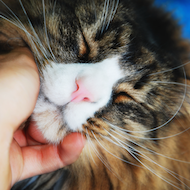
'Keeping Cats Safe' to cover all areas of cat safety
International Cat Care (iCatCare) is joining forces with the Veterinary Poisons Information Service (VPIS) and Agria Pet Insurance to launch a new 'Keeping Cats Safe' campaign.
Launching this month, the campaign will run throughout 2015 and into 2016, covering all aspects of cat safety. Dangers such as poisons, accidental injuries and cats eating strange things will be highlighted, as well as which diseases can be prevented by vaccination and parasite control. The campaign will also feature the safe use of collars and microchipping.
There will be advice for owners on each topic, covering what the risks are, what the signs of injury/poisoning are, what to do and how risks can be minimised. For veterinary professionals, there will be in-depth advice on clinical signs, treatment and prognosis. The information will be made available both on the charity's website and in the charity's publications.
Claire Bessant, iCatCare chief executive, said: "The overall message of our campaign is that prevention is better than cure. Our goal is to spread the word by alerting cat owners to some of the most common dangers, as well as providing expert advice to help those professionals dealing with these distressing cases."
iCatCare will also work with its supporters and members, including members of its veterinary division the International Society of Feline Medicine (ISFM), to gather information about their experiences.
The campaign gets underway by pointing out the dangers of disinfectants, with advice for owners on their safe use. For vets and nurses, there is an introduction to toxicology, and detailed advice on presentation and treatment of benzalkonium chloride exposure in cats.
For more information visit www.icatcare.org.



 The Veterinary Medicines Directorate (VMD) is inviting applications from veterinary students to attend a one-week extramural studies (EMS) placement in July 2026.
The Veterinary Medicines Directorate (VMD) is inviting applications from veterinary students to attend a one-week extramural studies (EMS) placement in July 2026.